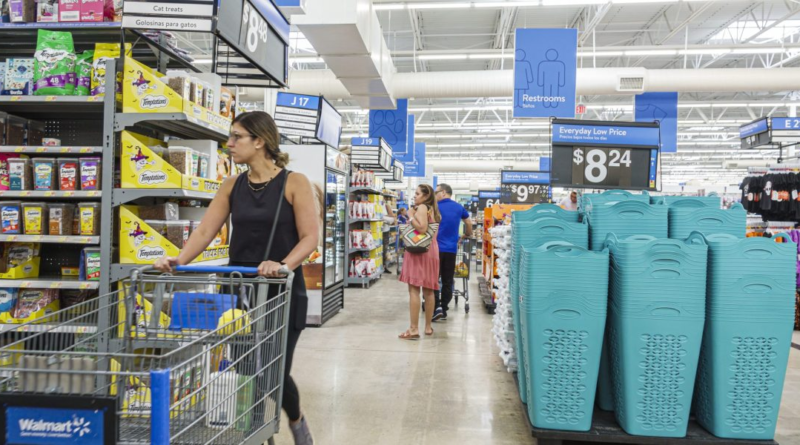Walmart and Target’s earnings pull back the curtain on an America struggling with high inflation
Economists have been looking for cracks in U.S. consumer spending for years now amid persistent inflation and higher interest rates, but until recently, Americans have defied the odds at every turn. Despite consistent recession forecasts and dismal consumer sentiment numbers caused by the soaring cost of living, Americans managed to continue spending at record levels until recently. But in April, retail sales growth stopped completely. And now, major retailers’ earnings reports have revealed some stark warning signs about the health of the American consumer.
First, to be clear, Walmart won the day. The retail giant topped Wall Street’s earnings and revenue forecasts in the first quarter, reporting adjusted earnings per share of $0.60, compared with the expected $0.52, and revenue of $161.5 billion, surpassing the forecasted $159.5 billion. E-commerce offerings and spending from high-income customers helped buoy the results. But the company also witnessed a key spending pattern that typically occurs when consumers are feeling financial strain: a shift from spending on wants to needs.
As Walmart CFO John D. Rainey explained on an earnings call with analysts on May 16: “Many consumer pocketbooks are still stretched, and we see the effect of that in our business mix as they’re spending more of their paychecks on nondiscretionary categories and less on general merchandise.”
Walmart said it has increased the number of price cuts, or “rollbacks,” that it offers on key items to boost sales, partly because, as Rainey repeated on the call, “wallets have been stretched.” When asked why he declined to raise Walmart’s forward earnings guidance by Morgan Stanley analyst Simeon Gutman, Rainey also gave a telling response, emphasizing his uncertainty around consumer spending.
“I think we’d all agree that we’re in far from a certain environment around the consumer. The health of the consumer is something we read about every single day, and given that we’re one quarter into the year, we just want to be patient,” the CFO said.
It wasn’t just Walmart that brought up concerns about the health of the consumer in its first quarter earnings report. Target saw its net sales drop 3.1% from a year ago to $24.5 billion in the first few months of 2024, and missed earnings estimates, with diluted earnings per share coming in at $2.03, compared with the forecasted $2.05. Inflation-weary shoppers turned toward necessities during the quarter, according to Target, leading to the sales and earnings dip.
In a follow-up call with reporters, chairman and CEO Brian Cornell said that Target shoppers’ “biggest challenges” are “inflation in food and household essentials,” Yahoo Finance reported. Cornell even added that there has been a “strain on the consumer wallet” in an echo of Walmart CFO John Rainey’s comments.
Target saw a comparable store sales decline of 4.8% in its physical stores in the first quarter as shoppers looked for cheaper options, and only a slight rise in comparable online sales. In a move to prevent further sales declines, the company unveiled a plan to slash prices on nearly 5,000 everyday items like groceries and diapers.
But on Target’s earnings call with analysts Wednesday, chief growth officer Christina Hennington noted that she is paying close attention to consumers’ ongoing financial strain to determine the correct path for the company, signaling that price cuts might not be enough to reignite growth.
“The sustained level of elevated prices has had a meaningful impact on budgets and savings for many families,” Hennington said. “Currently one in three Americans has maxed out or is nearing the limit on at least one of their credit cards. For these reasons and more, we remain cautious in our near-term growth outlook.”



